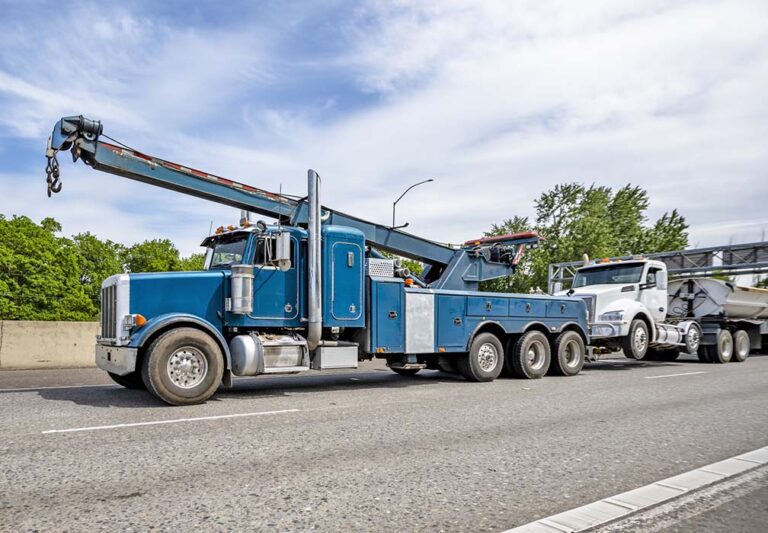WASHINGTON — Memphis, Tennessee, is known for being the home of Elvis, blues music and great barbecue.
But in the trucking world, this city on the Mississippi River has long been a hot spot for predatory towing.
On May 30, The American Trucking Associations (ATA) commended Tennessee on enacting comprehensive reforms to crack down on predatory towers that target heavy-duty trucks.
The bill, SB1692/HB1731, was signed into law by Gov. Bill Lee after passing the Tennessee Senate unanimously and the House overwhelmingly without a single dissenting vote.
According to the ATA, predatory towing entails “any incident in which a towing operator severely overcharges; illegally seizes assets; damages assets by use of improper equipment; or illegitimately withholds release of a truck, trailer and/or cargo.”
The ATA shared the story of one trucker who, last fall, was prevented from paying a $275 booting fee while in Memphis. Her company was forced to pay thousands of dollars for the return of the vehicle.
In a separate incident, a trucker was booted and blocked in while he was in the process of paying for parking in Memphis, according to the ATA.
He waited in his truck for more 33 hours to prevent it from being towed.
“Tennessee’s new law, which was drafted by Senate Majority Leader Jack Johnson (R-Franklin) and Representative Jake McCalmon (R-Franklin) with recommendations from the Tennessee Trucking Association, will protect truckers by prohibiting unlicensed individuals from booting vehicles anywhere in Tennessee,” the ATA said.
The law limits booting to commercial lots only.
In order to boot a vehicle in a commercial parking lot, a licensed parking attendant must be present, easily identifiable as an employee of the commercial lot and available to remove the boot within 45 minutes from point of contact. The law caps the fee to remove a boot at $75.
Notice provisions will ensure drivers are aware that parking in a lot without pay could result in the vehicle being booted or towed.
“Most noteworthy for the trucking and transportation industry, this legislation will make it illegal to boot or use a device to immobilize any truck and trailer in Tennessee that is clearly identified as a commercial vehicle with a USDOT number or with a commercial license plate issued for all classes of trucks and trailers described and registered pursuant to T.C.A. 55-4-113(a)(2) and T.C.A. 55-4-113(a)(5),” the ATA noted.
The legislation also ensures that vehicle owners are properly notified if their vehicle is towed, sold or demolished by a towing company and directs the Department of Revenue to create a motor vehicle portal.
The portal may be accessible by law enforcement, towing companies, vehicle owners and lien holders. The portal, to be active by July 2025, will be used for all public notifications of the sale of unclaimed vehicles.
“Predatory towing companies that hold equipment and cargo hostage with inflated, excessive and fraudulent invoices tarnish the reputation of the entire towing sector. They have taken advantage of the trucking industry for far too long, and we refuse to continue making these ransom payments any longer,” said ATA President and CEO Chris Spear. “ATA’s federation of state associations is prepared to fight back against unscrupulous companies that target our industry by injecting more accountability and fairness in state and local laws pertaining to towing.”
The ATA noted that there “is an essential partnership between trucking companies and towing companies, and truckers depend on towers when there is a mechanical breakdown.”
“Unfortunately, when a truck is towed without the owner’s consent, rogue towing companies can exploit the situation,” the ATA said. “Truck drivers and trucking companies have little choice other than to pay the exorbitant bill since the truck is their livelihood and deliveries may be time sensitive.”
According to a recent study by the American Transportation Research Institute, the most common types of predatory towing are excessive rates, experienced by 82.7% of motor carriers, and unwarranted extra service charges, experienced by 81.8% of carriers.
A majority of carriers encountered additional issues such as truck release or access delays, cargo release delays, truck seizure without cause and tows misreported as consensual.
The trucking industry employs nearly 250,000 Tennesseans across the state. More than 90% of Tennessee communities rely exclusively on trucks to receive their goods, according to the ATA.
At the end of the day, Tennessee’s trucking industry leaders say they are just glad they now have a more level playing field when it comes to dealing with tow companies.
“Several high-profile predatory towing incidents in Tennessee have exposed how this egregious practice not only disrupts our state’s supply chain, but also costs truck owners thousands of dollars for each unwanted tow,” said Tennessee Trucking Association President and CEO Donna England. “We are grateful to Majority Leader Johnson, Representative McCalmon and Tennessee legislators for listening to our concerns about this unfair tactic, and we thank Governor Lee for swiftly signing this bill into law. We look forward to our continued partnership with our state’s leaders on commonsense reforms that promote justice, fairness and safety. Trucking is the linchpin of our economy, and we should be prioritizing policies that are welcoming to truckers who deliver the goods we count on every day.”
Born in Pine Bluff, Arkansas, and raised in East Texas, John Worthen returned to his home state to attend college in 1998 and decided to make his life in The Natural State. Worthen is a 20-year veteran of the journalism industry and has covered just about every topic there is. He has a passion for writing and telling stories. He has worked as a beat reporter and bureau chief for a statewide newspaper and as managing editor of a regional newspaper in Arkansas. Additionally, Worthen has been a prolific freelance journalist for two decades, and has been published in several travel magazines and on travel websites.









Trucks need to quit delivering anything to Memphis